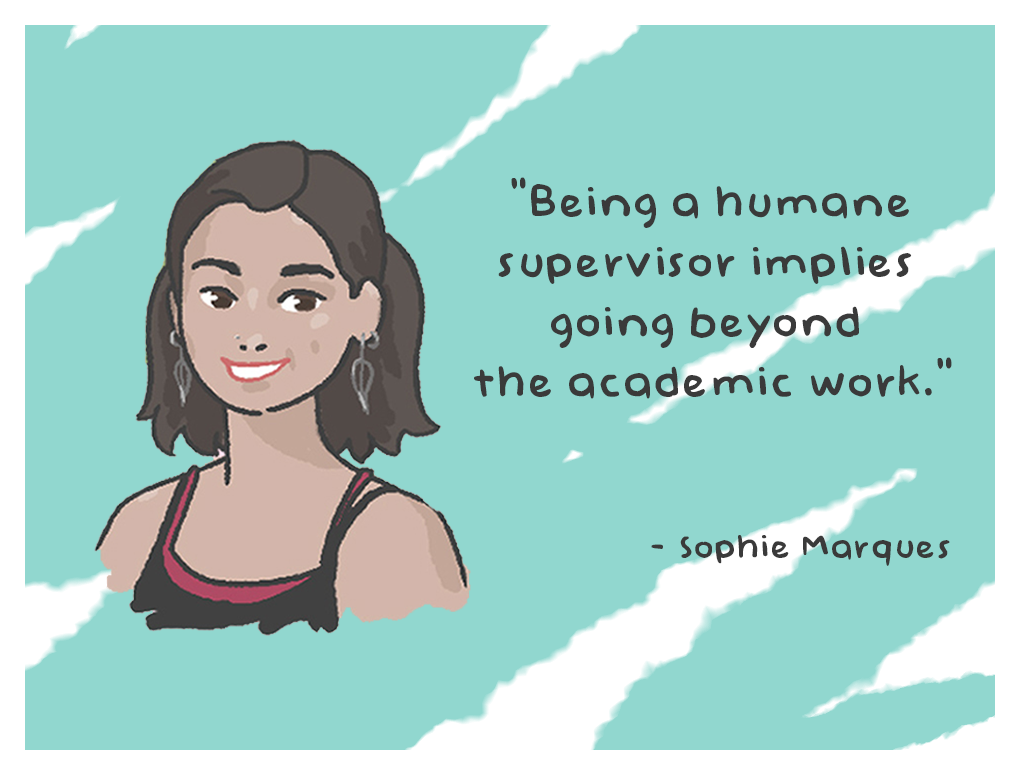The recipients of the DAAD scholarship in Africa encounter various social, cultural, financial, and academic challenges before they can fully focus on their PhD studies. There is a call to all supervisors to adopt a comprehensive approach and foster a supportive environment that helps these students achieve their intended goals.
In this column, I want to share my personal experiences as a PhD supervisor for students from different countries in Africa. It is essential to acknowledge that my perspective is shaped by my own lived experiences and cannot represent an entire continent, country, or locality. As someone with a mixed cultural identity, having been educated in France, spent four years in the Courant Institute at NYU, and moved to South Africa a few years ago, I have had the privilege of being exposed to a multitude of cultures and perspectives. I have also developed expertise in the areas of Algebraic Geometry and Number Theory, which are particularly underrepresented fields of mathematics in Africa.
Supervising DAAD Scholarship Recipients: An Exciting and Challenging Journey
When I heard about the opportunity to be a supervisor for DAAD scholarship recipients at my institution, I was incredibly excited. As a specialist in algebraic geometry and number theory, which are relatively scarce fields in Africa, I received numerous inquiries from highly qualified students. In fact, the two students I ultimately chose to support were outstanding, and I referred other great students to my colleagues to ensure they didn’t miss out on the opportunity to supervise these students.
Despite the rewarding experience of supervising these excellent students from different African countries, it was not without its challenges, especially during the COVID-19 pandemic. We had to adapt and conduct the first few months of their PhD program online before they were able to physically come to Stellenbosch University. Although there were initial obstacles, this online experience provided me with valuable insights into the differences between their reality and mine.
Overcoming Hurdles and Providing Support
One significant challenge they faced was being young parents who had to leave their families, including their toddlers, behind. This was undoubtedly a difficult position to be in. The male student, in particular, carried the weight of providing for his family, which added immense pressure. At times, he considered giving up, doubting he could afford the necessary funds for his plane ticket, health insurance, and accommodation. The female student, meanwhile, had to juggle her academic pursuits with household responsibilities. It considered it to be part of my responsibility to help find solutions and provide support during these trying times. Being a humane supervisor implies going beyond the academic work.
The visa process proved to be a tedious and frustrating experience for both students. Obtaining police clearance, and (for other students in the program), securing the SAQA certification, took an unexpectedly long time. It would be incredibly helpful if the extent of this preparatory work can be included a timeline and a comprehensive list of the required paperwork for each country, along with efficient methods to obtain them. Sadly, for some students, the political climate of their home country made it nearly impossible to obtain a visa. I vividly remember instances where students in the program returned to the embassy multiple times, only to face disappointment. Furthermore, securing accommodation and meeting the financial requirements for the visa added to their frustration. Witnessing their bravery and determination throughout this process was truly awe-inspiring, and I felt a tremendous sense of co-responsibility for their well-being and the realisation of their study plans.
Academic Progress and Personal Growth
Their experiences improved significantly once they arrived in South Africa. Their home obligations were less demanding, allowing them to fully concentrate on their mathematics research without distractions. The fields of research they pursued, field theory and algebraic geometry, have extensive background requirements, and the courses available to them in these fields were quite limited in their home country. This required them to absorb a significant amount of knowledge in a relatively short period. Nevertheless, they demonstrated exceptional motivation, consistency, and passion. Witnessing their progress was a testament to the fact that these qualities are far more important than merely accumulated knowledge without purpose. People often underestimate the incredible effort and progress made during a PhD journey, particularly for students who didn’t have the opportunity to study number theory and algebraic geometry extensively during their undergraduate and master’s degrees.

The Role of Supervision and Support
There were moments when I doubted my ability to cover the extensive background knowledge required. However, I quickly gained courage and trust in what was possible, and together, we achieved remarkable results. Patience and avoiding the temptation to rush became key factors in our success. A strong and solid foundation is crucial for comprehensive understanding. If it takes two years to build that foundation, so be it. We want researchers with a holistic vision of mathematics, not just within the scope of their research projects. Deep understanding, rather than superficial knowledge aimed at quick publications, is the goal. It is surprising how much can be accomplished in two years when time is managed effectively.
Given the extensive content that needs to be covered, I opted for a model of close supervision, which involved dedicating a substantial amount of time each week to meet with each student individually. This approach allowed for in-depth discussions and support while also managing other commitments. Although the exact amount of time may vary, this method has proven effective in ensuring thorough guidance and support for each student.We held three intensive research weeks that played a crucial role in their growth and development.
For supervisors with limited time, prioritizing key meetings and conducting group sessions can be effective strategies. Utilizing digital tools for communication and feedback allows for efficient interaction. Setting clear expectations and encouraging student independence help manage support within time constraints. Additionally, delegating certain tasks to colleagues or research assistants can further optimize supervision. By employing these strategies, supervisors can offer valuable guidance while balancing their own time limitations.
While a compassionate doctoral supervisor should certainly support students in both academic and personal aspects, it is crucial to maintain a balance. Supervisors can help by organizing opportunities and offering guidance but should also encourage students to develop their own skills in managing personal needs and professional responsibilities. It’s important to set clear boundaries to keep the relationship professional and to direct students to appropriate resources and services for additional support. Fostering open communication and modeling a healthy work-life balance are also key. This approach helps students become more self-reliant while ensuring they receive the necessary support without compromising personal boundaries.
Transformative Experiences and the Importance of Support
This entire experience has been life-changing for me. I am immensely grateful for the opportunity to work with such inspiring students who have reignited my passion for mathematics. It is important to recognize that cultural differences can play a significant role, and it may be challenging to feel understood and valued on an international level. Any form of supervision is a substantial responsibility that should not be taken lightly. The investment of time and knowledge required is significant, as it involves a three-year commitment and the lives of the students are in our hands. When you find a motivated and determined students, they can flourish no matter what with the right support system in place.
In conclusion, the following key insights emerged from this experience as a PhD supervisor for DAAD scholarship recipients from different countries in Africa.
Resilience and Determination
Seeing these students’ determination and resilience in the face of challenges underscores their remarkable strength and drive. Despite encountering obstacles, they stayed steadfast in pursuing their goals, showcasing the power of perseverance in attaining success.
Importance of Support
The importance of a supportive environment and attentive supervision cannot be emphasized enough. Regular meetings, establishing a safe and nurturing atmosphere, and arranging research weeks played a crucial role in nurturing the students’ growth and progress. This underscores the importance of comprehensive support systems for international PhD students.
Value of Cultural Exchange
Collaborating with students from diverse countries and cultural backgrounds underscored the significance of cultural exchange in academia. It illuminated the distinct challenges scholars from various regions encounter and emphasized the necessity for an inclusive and supportive academic environment that values diversity and acknowledges the contributions of scholars from diverse backgrounds.
Holistic Understanding and Foundation
The journey underscored the importance of building a strong foundation in the field of study, rather than solely focusing on research projects or quick publications. Nurturing a holistic understanding of the subject matter, alongside a comprehensive knowledge based, enhances the quality of research and contributes to the development of well-rounded researchers.
Responsibility of Supervisors
This experience serves as a poignant reminder of the substantial responsibility carried by PhD supervisors. Supporting and guiding students through their academic journey demands a profound commitment, as supervisors are entrusted with the students’ futures. It is crucial to offer the essential support, mentorship, and resources needed to empower students to achieve their utmost potential.
Limit to supervisor involvement and boundaries
While supervisors play a crucial role in guiding students, there are important limits to their involvement. It is essential for supervisors to provide support and guidance while setting clear boundaries to maintain professionalism and balance. Encouraging student independence and ensuring a healthy work-life balance for both parties helps to prevent overreach and burnout, ensuring effective and sustainable supervision.
By recognizing and reflecting upon these insights, the academic community can strive to create a more inclusive and supportive environment for international students. This entails fostering cross-cultural collaboration and nurturing the next generation of scholars. It is crucial to acknowledge the significance of cultural differences and implement comprehensive support structures to ensure the success and well-being of these students throughout their PhD journey. Through sharing our experiences and insights, we contribute to a broader understanding and appreciation of the challenges and triumphs faced by scholars from diverse backgrounds, thereby fostering a more inclusive and supportive academic environment.

Professor Sophie Marques
Department of Mathematical Sciences, Stellenbosch University


